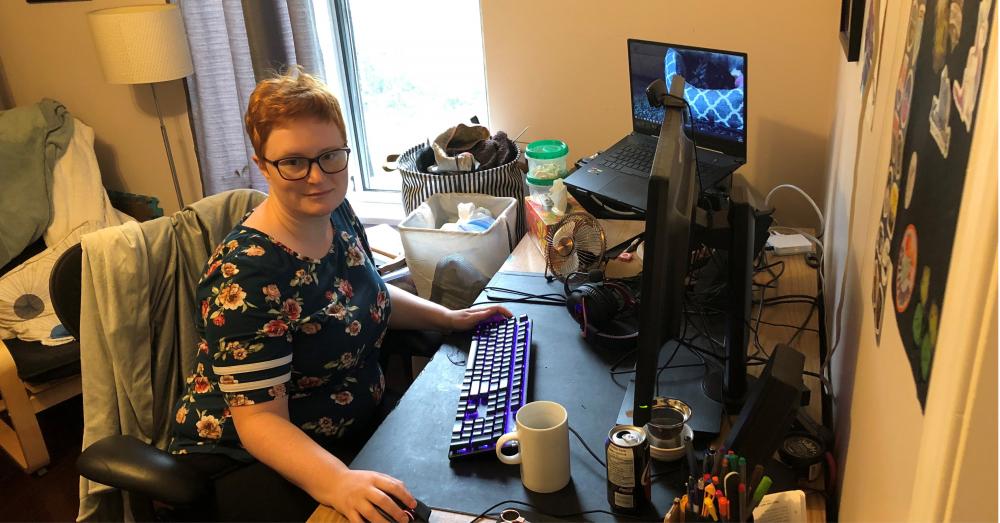The choice between joblessness and risky work
By Jill Slind, Co-chair of the HSA Young Workers' Advisory Group
As a full-time permanent employee with a few years of seniority under my belt in my unionized position in HSA, I knew when going into BC’s Phase One in March that my job in the healthcare sector wasn’t likely on the line.
I knew that if I felt ill, I could take paid sick leave and not risk losing my income, and still put food on the table. But when we entered Phase One and decisions were made as to which jobs were considered essential, every person in BC understood that there are many people whose labour our society truly depends upon.
Our economy and society as we know it depends on the underpaid, non-unionized labour of young people and people of colour: people who enter the workforce in a tight job market – making minimum wage or just above – and work in grocery stores, meat-packing plants, warehouses, and manufacturing. Some of these people have dived in headfirst into the gig economy and deliver packages or food all over the city, hoping that their vehicles can handle the strain of the hundreds of kilometers put on them month after month.
When society shut down and healthcare workers were struggling to get PPE in order to be around patients safely, thousands of workers were exposing themselves to the public with whatever protections their employers provided, and, failing that, what they could get themselves.
Because many of us work in the public healthcare sector, we had the organizational and public support necessary to effect change to get ourselves protected while at work. But employees in meat processing plants, long-term care homes, and the agricultural sector all suffered massive outbreaks, in part, because their employers failed to provide enough necessary protections to their workers.
And while CERB provided relief to those who were laid off or had their hours cut, it did not offer employment insurance to those who determined it was unsafe for them to continue in their positions and walk out.
If you are an avid reader of this publication, you are likely aware of the right to refuse unsafe work. At-risk workers, especially migrant workers and young people, may not be as aware of this right, or are unable to risk the possibility of retaliation or going without pay if they refuse and report unsafe work – which can occur despite being prohibited actions under the Workers’ Compensation Act.
According to WorkBC, 47 per cent of all cashiers are younger than 25. In May, CNN reported that health and safety experts consider the cash register to be the most dangerous place to work in a store, where there is increased risk of exposure to COVID-19.
Their places of work were some of the busiest at the beginning of the pandemic.
Should we clap hands every day at 7:00 pm in thanks for their service as essential workers? Should they simply be grateful that they even have a job at all, amidst the layoffs that they are disproportionately affected by? Workers between the age of 15 and 24 are facing a nearly 29 per cent unemployment rate, according to a recent labour force survey by Statistics Canada.
According to the Canadian Centre for Policy Alternatives, racialized workers make up 21 per cent of Canada’s workforce, but are disproportionally represented in supply chain occupations and sales and service occupations at the frontlines of COVID-19, such as security guards (31 per cent), light-duty cleaners (29 per cent), and sales representatives in wholesale and retail trade (22 per cent).
Should they too be grateful for the opportunity to remain at work amidst the economic crisis of COVID-19, despite what their employers provide or fail to provide for their own protection?
As we adjust to the “new normal” after the most acute phase of this pandemic, and as we deal with our second wave, we need to keep the pressure on our politicians and policy makers to uphold and instate pro-labour policies, such as the $15 minimum wage, expanded access to childcare, and investments in public infrastructure. One easy way to keep up this pressure is to send a letter as part of the Canadian Labour Congress’ Forward Together campaign:
https://canadianplan.ca/better-jobs/send-a-letter/
We also need to vote for individuals who will enact or uphold these policies and promises. We need to talk to nonvoters or people who are voting for the first time, and let them know that their voice is important in shaping the future of our province and our country, and the labour movement.
BC and Canada will recover from the COVID-19 crisis. We have the opportunity to shape this recovery in a way that helps the people that need it the most, and ensure that the people in our most essential professions are safe to continue to work without fear of exposure.

This article first appeared in the October 2020 issue of The Report magazine.